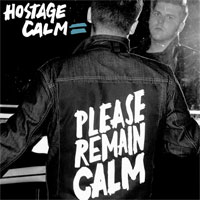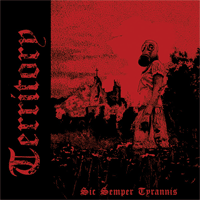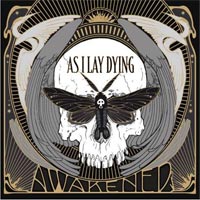STRIKE ANYWHERE
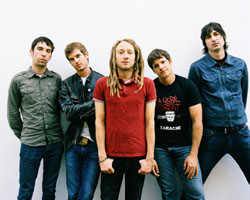 I’ve spoken a couple times with STRIKE ANYWHERE frontman Thomas Barnett and at the end of each conversation, I’d always wish I had more time to speak with him. So, when Jordan sends me an IM saying “Hey, Fat Wreck wants to know if we’d like to speak to STRIKE ANYWHERE, you want to do it?” I responded in the affirmative without a second thought. For those not in the know, the group is from Richmond, VA, and get this, doesn’t mention it in every fucking song. Like labelmates and fellow townies, AVAIL, STRIKE ANYWHERE flirts with hardcore, but it’s clear their heart is’ in sing-along punk rock, and not in the circle pit. And if their heart’s in punk rock, their heads are buried in current events literature reading about all of the things Uncle Sam sweeps under the rug, and putting them into song. You’re going to be hearing a lot about the first track “Sedition” in the press, since that’s the best one on Dead FM, but also because it’s about nuclear weapons and Thomas’ grandfather, but it’s the songs about standing in solidarity with the Native American Conciousness Movement, marching alongside gays and lesbians, and about the brutal killing of an Australian aboriginee that will remind you there’s more to the band than local politics and fallout from the Manhattan project. Much like every other time I’ve spoken with Thomas there’s a couple more questions I want to ask (what was that great chorus he wrote when he tried out for KID DYNAMITE?), but hey, that just gives me material for the next time I see him, whenever it may be…
I’ve spoken a couple times with STRIKE ANYWHERE frontman Thomas Barnett and at the end of each conversation, I’d always wish I had more time to speak with him. So, when Jordan sends me an IM saying “Hey, Fat Wreck wants to know if we’d like to speak to STRIKE ANYWHERE, you want to do it?” I responded in the affirmative without a second thought. For those not in the know, the group is from Richmond, VA, and get this, doesn’t mention it in every fucking song. Like labelmates and fellow townies, AVAIL, STRIKE ANYWHERE flirts with hardcore, but it’s clear their heart is’ in sing-along punk rock, and not in the circle pit. And if their heart’s in punk rock, their heads are buried in current events literature reading about all of the things Uncle Sam sweeps under the rug, and putting them into song. You’re going to be hearing a lot about the first track “Sedition” in the press, since that’s the best one on Dead FM, but also because it’s about nuclear weapons and Thomas’ grandfather, but it’s the songs about standing in solidarity with the Native American Conciousness Movement, marching alongside gays and lesbians, and about the brutal killing of an Australian aboriginee that will remind you there’s more to the band than local politics and fallout from the Manhattan project. Much like every other time I’ve spoken with Thomas there’s a couple more questions I want to ask (what was that great chorus he wrote when he tried out for KID DYNAMITE?), but hey, that just gives me material for the next time I see him, whenever it may be…
Pastepunk: Was the more melodic nature of Dead FM due to the more relaxed nature in the studio, or was the more relaxed nature in the studio due to the more melodic nature of Dead FM?
Thomas: I’m thinking now that the melodic nature of Dead FM (notwithstanding the gutteral breakdown battle cries, my aging vocal chords, and other shouted bits) may have to do with our time of three years writing the songs in quieter, acoustic and spare vocal – and – guitar settings. A lot of porch sessions while off tour, and back room writing while touring occurred. I think we all wanted to expand the number of voices on the recording, since there is a lot of singing from Matt (Smith) and Matt (Sherwood) live, as the songs get played more and change from the records. The record is also a great deal faster than Exit English, as those songs are played sometimes twice as fast live as on that recording. We wanted to remedy that inconsistency on Dead FM so we just had Eric play his drum tracks live with the four of us, getting each take of a whole song at full speed, while the rest of us played and shouted along.
Pastepunk: Is “the male cultural disguise” just another way of the saying boys don’t cry, and what does “the male cultural disguise” mean in the context of “Instinct”?
Thomas: Yes, it’s definitely about the numbness, competitiveness, and silence that growing up male requires. Family violence, child abuse, neglect; the harvest of this patriarchical void. I have so many close friends who were beaten regularly by their fathers (and step fathers) throughout their childhood, thinking that it was normal. I bet you know some too. Smashing this psychology and stopping the transfer of violence, entitlement and domination will make songs like “Instinct” no longer necessary. Just providing a safe place where communication is possible, outside of a broken family, is one of the profound moments within this punk culture, one which happens often a very natural way. This song has its own fourth wall, like when the video concept and execution collided, where that lyric and the one which follows, describe the purpose of the song, within its narrative. Accidental self awareness of art, embedded in its media – a punk phenomenon?
Pastepunk: What attracted you to or how did you hear about the plight of the aboriginals in Australia?
Thomas: Our song, “Iron Trees” is inspired by headlines and the street talk surrounding the Red Fern Anti-Police Riots in Inner City Sydney, which occurred in February 2004 , before we arrived for our second Australian tour. There was a lot of horror and silence surrounding the event, which left a young aboriginal man of 17, T.J. Hickey, dead from what was confirmed as police negligence. He died, impaled on a fence after a police car chased him on his bicycle. This struck a chord with me, as our first Anti-police brutality song “Sunset On 32nd” was inspired by cops chasing, and beating my across the street neighbor while he biked home from the store. Curiously, my Australian Uncle, with whom we often stay in Sydney, is friends with a remarkable lady, who is the New South Wales Tribal representative of the Courie. She has done the welcoming ceremony at Parliament openings, and the Olympics, when they were in Sydney. Her perspective, wisdom and good humor made a deep impression on me. It also got me curious about trying to articulate the plight of a people bringing another world and highly differentiated sense of time and landscape with them into our rigid cities of concrete and steel. It’s fundamentally important to try and understand how psychologically difficult it is for any indigenous, or rural subsistence culture to adjust to our western structures of modernity. The lyrics are my attempt to tell a story of cultural dissonance and the strange clash of realities between the indigenous and the western world.
Pastepunk: Would you put together some thoughts on the current immigration debate?
Thomas: There are a lot of people who profit from preserving the inequalities between Mexico and the U.S. Maquiladoras – sweatshops in mostly border towns for cheap labor under inhumane conditions for many U.S. Corporations – are a shadow production juggernaut for the enhanced profits of stockholders of scores of large conglomerates. The political, economic, historical and cultural borders between these two nations are always being rewritten in an ongoing fiction of law, blood and money, so, I reserve the right to despise (and shout down outside the Richmond Capitol this past May) the Minutemen, and other new nationalists who think they are reinventing the wheel with this nonsense. It’s strange and dystopian to me that money, resources, and war can pass through these lines drawn on the earth but not people looking for safe and peaceful place to live and work.
Pastepunk: How was the current tour (Ignite/Modern Life is War and Bane/This Is Hell) put together?
Thomas: We were interested in a multi-regional punk tour with bands representing from three of the four U.S. time zones. And we were really curious about MLIW, after having heard their music. And liking it. We wanted to see how to fold in the different ‘factions’ within this beautiful mess of punk and hardcore culture, and we will have to wait ’til the Bane part starts in earnest to asses whether we achieved any kind of unity or difference.
Pastepunk: Your experiences with the clergy don’t seem to be positive to say the least — what are some experiences you can point to that gave you this opinion of them? 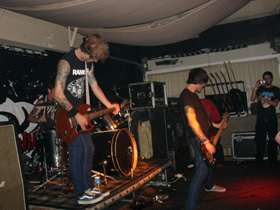
Thomas: I actually had a youth minister who was kind of a punk rocker, a man who played music, made recordings, played Dungeons and Dragons, and took some youth group kids to the ghettos of Richmond to help out and mentor other kids who were in impoverished and fragile circumstances. Eventually, I was one of the only suburban kids who continued doing this elective, church sponsored urban outreach program, and I went to the local record store and bought punk records after those Summer days in Gilpin Court (a housing project reknowned for its violence and drug trafficking), playing basketball and sitting in circles with kids who had half of a parent, talking about their dreams and trying to connect. Aside from this interesting, influential character, my untiring and optimistic Presbyterian mother, and a few righteous, active Catholic Workers setting up Tent Cities to shame the city in the Summer heat while living alongside the homeless population – my overarching impression of Christianity is one of hypocrisy and a status quo reinforcement through selective scriptural postures. I took a few courses at a Seminary, mostly in apocrypha, and the cultures surrounding the Q document (those Dead Sea Scrolls), the Essenes, and the Apocalyptic Judaism in the deserts around Jerusalem during the time of the man many think was Jesus. I learned a lot about how precisely edited for social control the modern Bible is, and how ministers in the West further contain and focus the message to keep money flowing in its prescribed directions, and getting people just scared enough, and just guilty enough, and just vain enough in their religious disguises to fall into their places and see the world in this regressive, morally fucked up way. I’ve watched churches in the white suburbs become more and more conservative, pandering to venal millenial fears, and profiting from dividing people from their consciousness in all of its bright compassion. The idea of a God built exclusively for our species is really dangerous, and divorces us form our connection with other life on this living earth. The damage to women that these fundamentalist, or literalist incarnations of Abrahamic faiths can do is unquestionably evil, and it’s important to understand our own role in this modern witch burning and ‘spiritual criminalization’ of homosexuals, and women who choose to control their reproduction. If we survive these current times of asymmetry, war, and deception, I hope we will be able to speak clearly about the pathology and hindrance to our evolution that our western religious cultures have become.
Pastepunk: Does or can the media provide objective information?
Thomas: In my experience, as hard as it is sometimes, you have to make the media work for you, in a sense that you have to understand from where it originates, and whom it serves. Most of us: working two jobs, exhausted and spellbound by entertainment choices, don’t have the resources or time to sort out the right three dimensions on our news, and even the critical thinking for radicals can be a losing battle with frustration, or our own bias. I try to pick one headline, or issue a day, and then source it across a half dozen papers, journals, and online chatter, anchoring any questions I may have about the story to a couple (never as many as I need, probably) scans of theory. This is my attempt at getting some kind of fairness out of news, and I still feel like my best moments of understanding come from conversations with folks out in the world, when daily treadmills slow down a little and people can begin to really listen to each other. Often, during a lunch break at work, later over a beer, or while walking around the cities where we live.
Pastepunk: Any plans for an INQUISITION reunion show?
Thomas: Myself and my former bandmates are all really busy with new bands, and, as much as I am in touch with the Inquisition fellas, we rarely see each other, especially me and Mark (the guitarist) because he lives now in London, UK, and I live in Portland. At the end of this tour in seven days, Strike Anywhere will have an acoustic benefit show in Richmond for the VA Fair Wage Alliance, and Rob from Inquisition, Ann Beretta, and the Foundation Band will play with us. We may bust out a few old songs at this event. One day, we will all miraculously be in Richmond together, and this reunion thing may gel a little more. . .
Pastepunk: What was Richmond like before AVAIL?
Thomas: I remember an art school ghetto in Oregon Hill with lots of backyard parties, and crazy fire breathing punks. My first show was a free GWAR event, when I was fifteen, in 1987 when they had no label, no budget, just loincloths, roller skates, foam battle axes, and disturbing home-made masks…. A lot of SST Records jazz-punk, White Cross and thrash bands, rasta-core brought to us by radiation from D.C. and the Human Rights (H.R.’s more-reggae side project) Band. I also remember a thriving skinhead scene of nazis, traditionals, and the occasional brave SHARP. Me and some brilliant dropout punk friends fixed up (mostly with graffiti) an old two story Reconstruction Era barn on the western edge of town, and started having shows that were often near-riots, these weird parties with rednecks, non-racist skins, punk kids, furtive goths (these would be eighties goths!) trying to get along and build something, just to tear it down. It was really a brave new world as far as D.I.Y. was concerned, and the band that tied it all together was Four Walls Falling, Jade Tree’s first LP, and a righteous and musically untouchable political hardcore band. This was my ‘dual consciousness’ turning point from exclusively being into underage drinking, trespassing, and running from police and skinheads. It taught me that there was something to engage in, to build and articulate further than just leather jacket paint, and homemade tattoos. In the Spring of 1988, Fugazi came to town, playing at the reggae club, New Horizons, with Guy as a roadie and occasional back up singer. This was thrilling and revolutionary to my punk experience, no doubt, but the final hinges came off the doors when that Summer, I saw the Bad Brains with Corrosion of Conformity in VA Beach… By the time Avail moved to Richmond in 1991, a second generation of positive hardcore bands and creative punk kids were gaining confidence, and the scene was starting to get a new character, changing from the dark, impressionistic Mid-Eighties. On New Year’s Eve 1990, in a house on Cherry Street, I met Beau and Tim Barry, I think they were pissing in random beer cans, and watching gleefully while wasted, pompous frat people would drink. I liked them instantly. They established the first Avail House, and added just the right amount of numbers and intellect to push the scene to its tipping point; we then organized and happily kicked out the remaining Nazi skins, started Inquisition, and a dozen other bands, all with character and a singular sense of mission, and the third generation of Richmond Punk came into its own.
Pastepunk: How would you package a tour with THE EXPLOSION and BEDOUIN SOUNDCLASH?
Thomas: I love these bands as people and their music. It’s so hard to follow either one, in a live context, maybe we would both open for BSC in Canada, and then rotate the line-up everywhere else. Maybe we would develop cool, bleedy segues between bands, and have a continous wall of music and rhythm to treat ourselves with. I don’t know. It would be awesome , and very true to at least what I think punk needs to remember about itself sonically and culturally.
Pastepunk: What are the circumstances in which you guys would play “Notes On Pulling the Sky Down”?
Thomas: We actually play that song at least once a tour. It’s hard to fit it into a set, and it requires a kind of mood, to get that middle part right. I think a lot of our band feel it is too long and strange of a song to play regularly. This doesn’t mean we don’t enjoy it, and mean it, when we do.
Pastepunk: How do you know Dan Yemin?
Thomas: I’ve known Dan for over a decade now, and consider him a close and inspiring friend. Our old bands (Lifetime, and Inquisition) used to play shows together back in 1995-6. We got along instantly. I enjoyed my tryout for Kid Dynamite, and my time with him around that era as well as in these modern, millenial times with Paint It Black, Lifetime(!) and his inclusive, intelligent, and passionate sense of participating in punk. I will be honored to continue to know him for a long time.
Pastepunk: Dead FM appears to have more “solidarity” songs than previous releases. Why?
Thomas: I don’t precisely know. We noticed that there was a lot more specific issue-based songs cooking up for this record, and one of its tenative titles, at least lyrically, was actually “My Solidarity.” I think choosing Dead FM as the final title came from place of more urgency, and specific protest (the militarization of pop culture, the commodification of protest culture, a shout out to the counter recruitment movement, etc.) While in the studio, I definitely called this the ‘Love’ record, and it seems to be more about extending strength and compassion to all our people, with all our power. Instead of dark, shrill, critical foreign policy anthems, we wanted to get down to the roots of this mess, and uncover some of the social pathology that all of this outward violence and hypocrisy grows from. I hope we succeded. For us, I know we feel satisfied with the record and thrilled to have these new songs to bring to the world.
Pastepunk: How have PETA and PETA2 treated Strike Anywhere and you personally? I know a lot of people have been ridiculed and spat on by people bearing PETA leaflets and I was wondering if the way they treated bands was any different.
Thomas: I have had good experiences working with PETA, and having them table our shows, and spread the word about the vegetarian lifestyle. I have always preferred grassroots, active, non judgmental approaches to educating and presenting cruelty free, animal rights ideas to people. My time in inner city Richmond neighborhoods, rescuing animals, and trying to get people on board to save as many lives as possible required a lot of collaboration with folks who had no idea about veganism, or the equality of our species with others. Reigning in my more righteous, theoretical, and emotional impulses to build networks with non-vegetarians was important in this scenario. I feel like there is a lot of glittery, sexed-up youth culture distraction in PETA2 that isn’t our taste as a band, but I still appreciate their courage and creativity. I think sometimes the shock value, gore films that numb the observer more than teach, and over-the-top condescension that a lot of animal rights media evokes is not productive and seems to fulfill the ‘righteous few’ stereotype of leisure class activism which also poisons the salience and vitality of many a well-meaning movement. And in this Animal Rights one, in my experience, we’ve got to concentrate on the day-to-day positivity and connective tissue across cultural and economic lines, and be ready to meet folks halfway who may be interested in learning more but aren’t prepared to completely immerse themselves at this point in their lives. I’ve seen too many enthusiastic and deeply committed animal rights activists lose focus, take on too much too fast, and burn out, completely overwhelmed and emotionally drained. So, to sum up: PETA: always, but don’t wait for any one national organization to change your neighbors, PETA2: sometimes, but … start your own animal rescue and rehabilitation network in your city: hell yes.
Pastepunk: What local Richmond bands would you like to shout out?
Thomas: Government Warning, Direct Control, Municipal Waste, Cloak/Dagger, Pink Razors, VCR, Avail.
Pastepunk: What do you geek out on?
Thomas: Everybody’s got their own things: Sherwood loves electronic design, robotics, metal sculpture, and skateboarding. Garth loves a lot of music, his friends and good times. Eric likes iced tea and his own secret electronic noise compositions, occasionally jogging, and raging with his housemates in Richmond. Smith works on motorcycles, collects guitars that he rarely plays, and follows a lot of the epic, multi-storied TV shows. I enjoy comic books, vegan cuisine, hanging out with my pets, watching them do funny things, astronomy recently, and a lot of films. I still love going to shows and seeing bands that I love play their hearts out.
Pastepunk: Is there a particular chain or store that you’re excited to arrive to on tour? Perhaps like Rollins had 7-11?
Thomas: We have a Strike Anywhere cult of devotion to the almighty Waffle House, the cheapest and weirdest breakfast/late night food stop in the South and East. It always lets us know we are returning to our home region when we start robotically looking for Waffle Houses even when nobody is hungry. Also, the amount of cooks and staff with prison tattoos is quite informative.
Pastepunk: What bands would you choose to open Strike Anywhere’s last show, whenever that may be?
Thomas: Our last show will be at Burning Man, with all of us self-immolating in the wickerman… OR! We’ll headline the last Lollapalooza ever (as long as it’s not Clear Channel) and demand the entire 1991 lineup to play the show with us… OR! We’ll play a show that we don’t know is our last, and our favorite touring bands of that season will be with us, watching us self-destruct, or celebrating our shared transition into something else…
Pastepunk: Are you tired of answering questions about your guitarist winning a contest from Gillette?
Thomas: No. Matt Sherwood’s rickety balance of amusement, confusion, and irritation at his odd fifteen minutes of fame is enlightening and disarming… his sense of perspective and good humor was never in question, nor the odd spectacle of this contest he won without knowing he was entered (his wife did it as a joke while we were on tour). His face graced the Times Square video billboards for nine days in the Winter of 2004 when no one seemed to look up. I call it Matt’s Wedding Shower ’cause he got a lot of entertainment electronics as a part of the prize for having the ‘Most Irresistable Face’ – some of which he returned for a washer, dryer, and a karaoke machine. He really needed a washer and dryer.
Pastepunk: On a related topic: Anna Karenina or Anna Kournikova?
Thomas: As a shout out to my wife, the Russian scholar, I’ll say Anna Karenina. Also, there’s more content in this fiction of class struggle and tragedy, than possibly in the public life of Ms. Kournikova.
Pastepunk: Ian MacKaye once said something along the lines of “I hate doing interviews because I feel like they’re all about one thing and they already know the outcome, they just want me to say fuck the major labels or talk about Fugazi,” and I’m honestly trying to come up with less political questions because, (and this is a good thing) you can go on for a while about politics, and people ask about that and that’s good, but goddamnit, I don’t want to rehash those ideas, “look, here’s another reason Thomas is pissed at the system” piece. I hope you understand this. So tell me and by extension, Pastepunk readers what you know, whether it be about being a Richmonder getting used to freezing Oregon weather or building a house…
Thomas: I feel you with your need to deconstruct this interview from the standard choreography, but I actually have appreciated your good queries and tone. I am still getting used to the Pacific Northwest, and its eternal grey rains of its Winter, but I love my time out there with Leslie and our nine pets. Fixing up the little one-story bungalow that we bought has been educational, rewarding and above-all a bit of art that I’ve enjoyed immensely. The time I’ve spent on 30 foot ladders, framing windows and caulking trim have diminished my fear of heights a lot, just by necessity. I also enjoy the challenge of fitting a second floor into an attic, customizing storage, bookshelves, and still having a design that holds sunlight for as long as possible. Making the rooms ‘breathe’ is the holy grail of creative carpentry, and I am still far from an expert, but it’s been really meditative and somehow, uh, spiritual to put this much love and permanence into something that you can touch. Music and words are my life, but they are wild and intangible. This shit is the best balance to spitting poems into the ether that I could find. Well, that and drinking in my backyard while staring through a telescope at other galaxies. Holy shit. Thank you. I’ve enjoyed this a great deal. Sorry If it got a bit long-winded there! Peace/Equality/Solidarity.
- Top photograph courtesy of Fat Wreck Chords. Lower photograph by Chris Moran.

